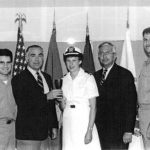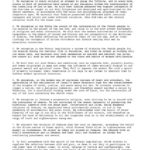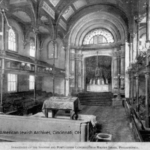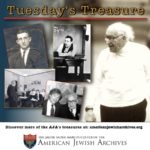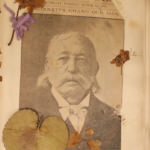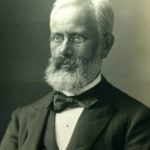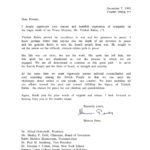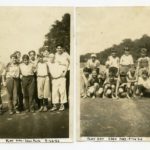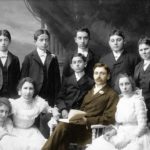Organizations & Institutions
The American Jewish Archives contains records of Jewish leaders serving as chaplains in the US military dating back to the Civil War; however, not until 1986 did the first commissioned active-duty female chaplain join such ranks. Cincinnati native Julie Schwartz was a student at HUC-JIR in Cincinnati in 1985 when she received ecclesiastical approval from…
Read MoreAlthough Mikveh Israel, Philadelphia’s first synagogue, was not founded until 1782, the land for its cemetery has an earlier history. A burial plot was first bought by Nathan Levy in 1738 when he suddenly needed a burial place for one of his children, and land was made available to him by Thomas Penn, the son…
Read MoreJacob Rader Marcus, the founder of the American Jewish Archives (AJA), was born in Connelsville, PA on March 5, 1896. Known as the “Dean” of American Jewish historians, Dr. Marcus was the first American born, scientifically trained historian to earn an academic Ph.D. to examine the American Jewish experience. In 1947—with the great centers of…
Read MoreRabbi Isaac Mayer Wise, the founder of the Hebrew Union College and the Central Conference of American Rabbis (CCAR), was born in Steingrub, Bohemia on March 20, 1819. Isaac Mayer Wise received a traditional Jewish education. He came to America in 1846 and soon began serving as rabbi at Congregation Beth El in Albany, New…
Read MoreIn 1903, after a lengthy search for a suitable replacement for Isaac M. Wise, Kaufmann Kohler was invited to interview for the presidency of HUC. He was unanimously approved by the HUC board and accepted the position, which he retained until his retirement in 1921. His presidency included many significant accomplishments: the restructuring of the…
Read MoreIn 1995, the Israeli Prime Minister Yitzhak Rabin was assassinated by an Israeli ultra-nationalist. The assassination happened at the peak of an anti-violence rally in support of the Oslo peace process, an attempt to create a framework for finding a solution to the ongoing Israel-Palestine conflict. Rabin, his successor, Shimon Peres, and Palestine Liberation Organization…
Read MoreWe take a moment to highlight the Big Brothers/Big Sisters Association of Cincinnati. This association, founded in 1910, was a charter member for what would later become Big Brothers/Big Sisters of America. The organization dates back to 1903 when Irvin F. Westheimer, an American Jewish Businessman from Cincinnati, befriended a fatherless child and decided to…
Read MoreThe Interdenominational Community Thanksgiving Service was founded in 1902 by Dr. Leo M. Franklin, Rabbi of Temple Beth El in Detroit, Michigan from 1899-1941. The first service, called “A Citizens’ Interdenominational Thanksgiving Service”, was held on November 27, 1902, in the Detroit Opera House. An account in the Detroit News stated that a capacity crowd…
Read More
